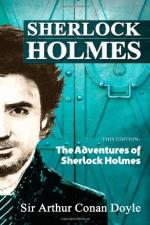“I should like to see him very much.”
“Would you? That is easily done. Come this way. You can leave your bag.”
“No, I think that I’ll take it.”
“Very good. Come this way, if you please.” He led us down a passage, opened a barred door, passed down a winding stair, and brought us to a whitewashed corridor with a line of doors on each side.
“The third on the right is his,” said the inspector. “Here it is!” He quietly shot back a panel in the upper part of the door and glanced through.
“He is asleep,” said he. “You can see him very well.”
We both put our eyes to the grating. The prisoner lay with his face towards us, in a very deep sleep, breathing slowly and heavily. He was a middle-sized man, coarsely clad as became his calling, with a coloured shirt protruding through the rent in his tattered coat. He was, as the inspector had said, extremely dirty, but the grime which covered his face could not conceal its repulsive ugliness. A broad wheal from an old scar ran right across it from eye to chin, and by its contraction had turned up one side of the upper lip, so that three teeth were exposed in a perpetual snarl. A shock of very bright red hair grew low over his eyes and forehead.
“He’s a beauty, isn’t he?” said the inspector.
“He certainly needs a wash,” remarked Holmes. “I had an idea that he might, and I took the liberty of bringing the tools with me.” He opened the Gladstone bag as he spoke, and took out, to my astonishment, a very large bath-sponge.
“He! he! You are a funny one,” chuckled the inspector.
“Now, if you will have the great goodness to open that door very quietly, we will soon make him cut a much more respectable figure.”
“Well, I don’t know why not,” said the inspector. “He doesn’t look a credit to the Bow Street cells, does he?” He slipped his key into the lock, and we all very quietly entered the cell. The sleeper half turned, and then settled down once more into a deep slumber. Holmes stooped to the water-jug, moistened his sponge, and then rubbed it twice vigorously across and down the prisoner’s face.
“Let me introduce you,” he shouted, “to Mr. Neville St. Clair, of Lee, in the county of Kent.”
Never in my life have I seen such a sight. The man’s face peeled off under the sponge like the bark from a tree. Gone was the coarse brown tint! Gone, too, was the horrid scar which had seamed it across, and the twisted lip which had given the repulsive sneer to the face! A twitch brought away the tangled red hair, and there, sitting up in his bed, was a pale, sad-faced, refined-looking man, black-haired and smooth-skinned, rubbing his eyes and staring about him with sleepy bewilderment. Then suddenly realising the exposure, he broke into a scream and threw himself down with his face to the pillow.
“Great heavens!” cried the inspector, “it is, indeed, the missing man. I know him from the photograph.”




